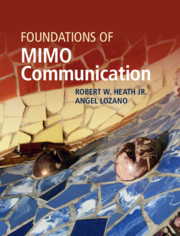Crossref Citations
This Book has been
cited by the following publications. This list is generated based on data provided by Crossref.
Saab, Sandy
Mezghani, Amine
and
Heath, Robert W.
2019.
Capacity Based Analysis of a Wideband SIMO System in the Presence of Mutual Coupling.
p.
1.
Molina, Francesc
and
Borras, Jordi
2019.
Low-Complexity Switching Network Design for Hybrid Precoding in mmWave MIMO Systems.
p.
1.
Nikbakht, Rasoul
Jonsson, Anders
and
Lozano, Angel
2019.
Unsupervised-Learning Power Control for Cell-Free Wireless Systems.
p.
1.
Roberts, Ian P.
and
Vishwanath, Sriram
2019.
Beamforming Cancellation Design for Millimeter-Wave Full-Duplex.
p.
1.
Maichalernnukul, Kiattisak
2019.
On the secrecy performance of transmit-receive diversity and spatial multiplexing systems.
PeerJ Computer Science,
Vol. 5,
Issue. ,
p.
e186.
George, Geordie
Lozano, Angel
and
Haenggi, Martin
2019.
Distribution of the Number of Users per Base Station in Cellular Networks.
IEEE Wireless Communications Letters,
Vol. 8,
Issue. 2,
p.
520.
Saxena, Amodh Kant
Mezghani, Amine
Heath, Robert W
and
Andrews, Jeffrey G
2019.
Linear Transmit Precoding with Optimized Dithering.
p.
838.
Saab, Sandy
Mezghani, Amine
and
Heath, Robert W.
2020.
Beamforming optimization of wideband MISO systems in the presence of mutual coupling.
p.
1338.
Asyhari, A. Taufiq
Koch, Tobias
and
Guillén i Fàbregas, Albert
2020.
Nearest Neighbor Decoding and Pilot-Aided Channel Estimation for Fading Channels.
Entropy,
Vol. 22,
Issue. 9,
p.
971.
Roberts, Ian P.
Jain, Hardik B.
and
Vishwanath, Sriram
2020.
Equipping Millimeter-Wave Full-Duplex with Analog Self-Interference Cancellation.
p.
1.
Jin, Sian
Roy, Sumit
Jiang, Weihua
and
Henderson, Thomas R.
2020.
Efficient Abstractions for Implementing TGn Channel and OFDM-MIMO Links in ns-3.
p.
33.
ElMossallamy, Mohamed A.
Zhang, Hongliang
Song, Lingyang
Seddik, Karim G.
Han, Zhu
and
Li, Geoffrey Ye
2020.
Reconfigurable Intelligent Surfaces for Wireless Communications: Principles, Challenges, and Opportunities.
IEEE Transactions on Cognitive Communications and Networking,
Vol. 6,
Issue. 3,
p.
990.
Myers, Nitin Jonathan
Kaleva, Jarkko
Tolli, Antti
and
Heath, Robert W.
2020.
Message Passing-Based Link Configuration in Short Range Millimeter Wave Systems.
IEEE Transactions on Communications,
Vol. 68,
Issue. 6,
p.
3465.
Zohdy, Maha
Song, Eva C.
and
Yue, Guosen
2020.
Finite Blocklength Analysis of Coded Modulation for Block Fading Channels with Linear Precoding.
p.
311.
González‐Prelcic, Nuria
Heath, Robert W.
Rusu, Cristian
and
Klautau, Aldebaro
2020.
UAV Communications for 5G and Beyond.
p.
203.
Thakur, Prabhat
and
Singh, Ghanshyam
2020.
Performance analysis of MIMO‐based CR–NOMA communication systems.
IET Communications,
Vol. 14,
Issue. 16,
p.
2677.
Siddiqi, Umair F.
Narmanlioglu, Omer
Uysal, Murat
and
Sait, Sadiq M.
2020.
Joint bit and power loading for adaptive MIMO OFDM VLC systems.
Transactions on Emerging Telecommunications Technologies,
Vol. 31,
Issue. 7,
Zhang, Jiayi
Bjornson, Emil
Matthaiou, Michail
Ng, Derrick Wing Kwan
Yang, Hong
and
Love, David J.
2020.
Prospective Multiple Antenna Technologies for Beyond 5G.
IEEE Journal on Selected Areas in Communications,
Vol. 38,
Issue. 8,
p.
1637.
Xia, William
Rangan, Sundeep
Mezzavilla, Marco
Lozano, Angel
Geraci, Giovanni
Semkin, Vasilii
and
Loianno, Giuseppe
2020.
Millimeter Wave Channel Modeling via Generative Neural Networks.
p.
1.
2020.
Wireless Connectivity.
p.
377.



